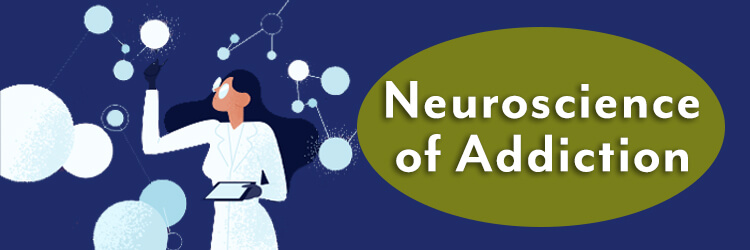[vc_row][vc_column][vc_column_text]Addiction isn’t a failure of will. It’s a complex interaction between genetics, environment, and neuroscience. Addiction changes your brain.
Addictive substances mimic natural rewards—like food and interpersonal connection—by interacting with the brain’s reward system. According to Bruce Goldman with Stanford Medicine, “Addictive drugs fire up the reward circuitry in a way that natural rewards can’t—by, in a sense, pressing a heavy thumb down on the scale of pleasure. Over time, the desire for the drug becomes more important than the pleasure the addict gets from it.”
Addiction is essentially a learned behavior. Your brain holds onto the emotional memory of the substance. Even if you don’t enjoy using the drug anymore, your brain registers it as more pleasurable than almost anything else. These changes in your brain make you crave and seek out the substance.
What causes people to use in the first place is a little less clear-cut, but it seems to be a combination of genetics and environment. What is known is that—in terms of environmental factors—trauma likely plays a key role. One study of nearly 10,000 people with addiction found that 90% had experienced traumas .
Another study found that increased levels of the protein Brain-Derived Neurotrophic Factor (Bdnf) may drive goal-oriented behaviors—and that stress may cause Neutrophin systems to atrophy. This could cause repetitive drug-seeking.
The good news is that this same neuroplasticity—essentially, the brain’s ability to change—might help with recovery. A study published in the journal Alcohol Research found changes in the brains of sober people that correlated with length of abstinence.
The two general networks the researchers focused on are called the “executive control networks” and the “appetitive drive.” Using fMRIs, the study authors found that people with Alcohol Use Disorder (AUD) have lower activity in prefrontal regions of the brain.These parts of the brain are part of the executive control network and normally help curb maladaptive behaviors. The study also found that people with AUDs have increased activity in the Amygdala and Insula, parts of the appetitive drive “which are associated with inflexible, poor decision-making.”
The study showed that longer alcohol abstinence was associated with elevated activity in the executive control network and lowered activity in the appetitive drive. This led the researchers to believe that longer abstinence may change the brain to support further abstinence.
This might be one reason newly sober people need particularly extensive support. As the study authors put it, “…individuals with shorter duration of abstinence are more vulnerable to relapse than individuals with longer abstinence and thus may need more vigilant emotional regulation.”
Therapies like Cognitive Behavioral Therapy (CBT) have also been shown to change the brain. CBT is about changing the connections between thoughts and behaviors. In general, therapeutic interventions can help people reframe their thoughts and emotions, as well as alter their behaviors. This may change things neurologically.
All of these findings make it clear that, while addiction is chronic, it is not a life sentence. Your brain starts to recover the moment you put down the substance.
If you are struggling with a substance use or mental health disorder, there is hope. TruHealing Centers is open throughout the COVID-19 crisis, with hospital-grade sanitization of our facilities and telehealth options. At our centers across the country, we will help you change your thoughts and behaviors to help you thrive in long-term recovery. Call an admissions specialist at 410-593-0005.[/vc_column_text][/vc_column][/vc_row]









